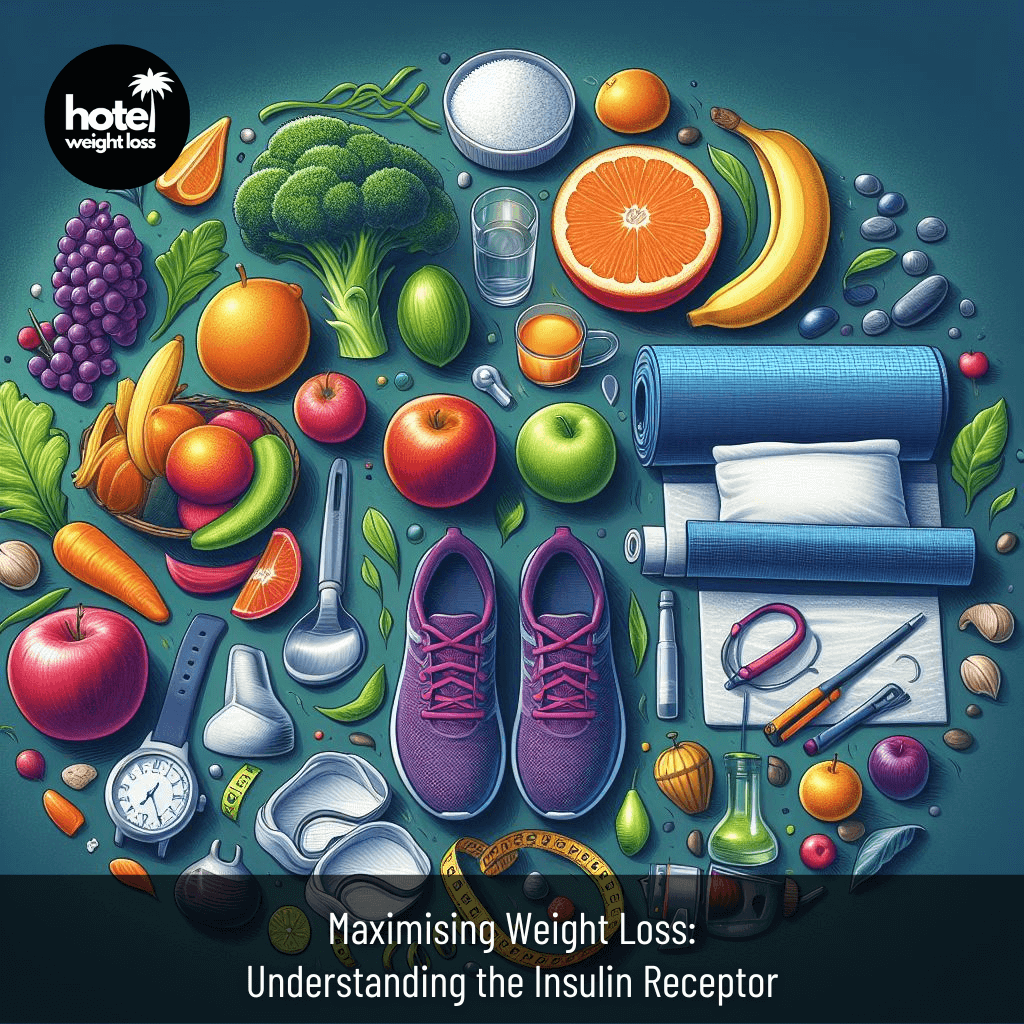Consider your body as a well-oiled machine, with every part serving a vital purpose. Among these components, the insulin receptor is a sentinel, regulating our body’s response to one of the most vital hormones—insulin. Knowing the nuances of the insulin receptor becomes critical in this age of ongoing struggles with obesity. Come along on a fascinating exploration as we dissect the structure, operation, and signaling pathways of the insulin receptor.
Key Takeaways
- The insulin receptor is essential for controlling the metabolism of glucose and is involved in weight control.
- Gaining knowledge about the composition and operation of the insulin receptor can help one develop efficient weight-loss techniques.
- By utilising its understanding of the insulin receptor, Hotel Weight reduction provides creative keto diet suggestions that are customised to enhance weight reduction potential.
Unveiling the Architecture of the Insulin Receptor
Structural Insights into the Insulin Receptor
The insulin receptor, a transmembrane protein, consists of two α subunits and two β subunits intricately woven together. These subunits have unique regions that bind insulin and start signalling pathways that go downstream. Within the α subunits lie the extracellular domains, facilitating insulin binding, while the β subunits harbour the intracellular tyrosine kinase domains, crucial for signal transduction.
Functional Dynamics of the Insulin Receptor
The α subunits undergo conformational changes upon insulin binding, leading to autophosphorylation of specific tyrosine residues within the β subunits. This phosphorylation event functions as a molecular switch, triggering signaling pathways downstream, including the MAPK and PI3K-Akt pathways. These pathways control the intake of glucose, the manufacture of glycogen, and the regulation of gene expression, among other cellular responses.
Signaling Pathways Orchestrated by the Insulin Receptor
The insulin receptor is a master regulator, dictating cellular responses crucial for glucose homeostasis and energy balance. Through complex signaling cascades, the insulin receptor regulates several essential metabolic processes, including as hepatic glucose production suppression, regulation of lipid metabolism, and muscle and adipose tissue glucose uptake. Dysregulation of these pathways can lead to insulin resistance, a hallmark of obesity and type 2 diabetes.
Implications for Weight Management
Understanding the role of the insulin receptor in metabolic regulation unveils novel avenues for weight management strategies. By targeting the insulin signalling pathway, interventions aimed at enhancing insulin sensitivity and promoting healthy glucose metabolism can be devised. Hotel Weight Loss leverages this knowledge to design personalised weight loss plans, optimising outcomes for individuals striving to shed excess pounds.
Leveraging the Insulin Receptor for Effective Weight Loss
Hotel Weight Loss pioneers a holistic approach to weight management, integrating scientific insights into the insulin receptor with innovative keto diet ideas. By tailoring dietary interventions to enhance insulin sensitivity and promote fat metabolism, Hotel Weight Loss empowers individuals to achieve sustainable weight loss goals. Contact our health specialists today to embark on your transformative journey towards a healthier, happier you.

Exploring Novel Therapeutic Approaches Targeting the Insulin Receptor
Pharmacological Modulation of the Insulin Receptor
Researchers are exploring pharmacological agents targeting the insulin receptor in the quest for effective weight loss interventions. Small molecule agonists and antagonists aimed at modulating insulin receptor activity offer promising avenues for combating obesity and metabolic disorders. These agents hold the potential to enhance insulin sensitivity, promote weight loss, and mitigate the adverse effects of insulin resistance.
Emerging Technologies in Insulin Receptor Research
Advancements in technology have revolutionised our understanding of the insulin receptor, unveiling novel insights into its structure, function, and signalling pathways. From cryo-electron microscopy to mass spectrometry-based proteomics, cutting-edge techniques provide unprecedented resolution in deciphering the molecular intricacies of the insulin receptor. These technological breakthroughs pave the way for targeted therapies tailored to individual metabolic profiles.
Harnessing Genetic Insights for Personalised Medicine
Genomic studies have identified genetic variants associated with alterations in insulin receptor signalling, offering valuable insights into personalised medicine approaches. By elucidating the genetic determinants of insulin resistance and obesity susceptibility, researchers can tailor interventions to target specific molecular pathways. Hotel Weight Loss integrates genetic testing into its comprehensive weight loss programs, enabling personalised interventions tailored to individual genetic profiles.
Lifestyle Modifications for Enhanced Insulin Sensitivity
In addition to pharmacological and genetic approaches, lifestyle modifications are pivotal in enhancing insulin sensitivity and promoting weight loss. Regular physical activity, balanced nutrition, and adequate sleep are essential pillars of a healthy lifestyle conducive to optimal metabolic function. Hotel Weight Loss emphasises adopting sustainable lifestyle changes alongside dietary interventions to maximise weight loss outcomes.
The Role of Gut Microbiota in Insulin Sensitivity
Emerging evidence suggests a crucial interplay between the gut microbiota and insulin sensitivity, implicating the gut-brain axis in metabolic regulation. Manipulating the gut microbiota through dietary interventions or probiotic supplementation holds promise as a therapeutic strategy for improving insulin sensitivity and metabolic health. Hotel Weight Loss incorporates gut microbiota analysis into its weight loss programs, offering personalised dietary recommendations to support a healthy gut microbiome.
Facts and Figures
Find below a diagram from the original journal article showing the structure of an insulin receptor.

Credit: https://sci-hub.wf/10.1152/ajpcell.1994.266.2.c319
Conclusion: Empowering Your Journey to Healthier Living
In conclusion, the insulin receptor is a linchpin in our body’s intricate metabolic machinery, orchestrating responses crucial for glucose homeostasis and energy balance. By unravelling the complexities of the insulin receptor, we gain valuable insights into strategies for effective weight management. Hotel Weight Loss stands at the forefront of this endeavour, offering innovative keto diet ideas and personalised interventions tailored to maximise weight loss potential. Take the first step towards a healthier lifestyle today and embark on your transformative journey with Hotel Weight Loss.
FAQs
-
What is the insulin receptor, and why is it important for weight loss?
The insulin receptor is a crucial protein in regulating glucose metabolism and energy balance. Understanding its function is essential for devising effective weight loss strategies, as it plays a central role in modulating cellular responses to insulin.
-
How does the insulin receptor impact insulin sensitivity?
The insulin receptor mediates insulin sensitivity by initiating signalling cascades that regulate glucose uptake, glycogen synthesis, and lipid metabolism. Dysregulation of these pathways can lead to insulin resistance, a common feature of obesity and metabolic disorders.
-
What are some lifestyle modifications that can enhance insulin sensitivity?
Regular physical activity, balanced nutrition, and adequate sleep are key lifestyle factors that improve insulin sensitivity and promote weight loss. Adopting healthy habits can complement dietary interventions and optimise metabolic function.
-
How does Hotel Weight Loss incorporate insights into the insulin receptor into its programs?
Hotel Weight Loss integrates scientific knowledge of the insulin receptor into its weight loss programs, offering personalised dietary interventions to enhance insulin sensitivity and promote fat metabolism. By leveraging this understanding, Hotel Weight Loss maximises weight loss potential for its clients.
-
Are there specific foods that can help enhance insulin sensitivity?
Certain foods, such as leafy greens, berries, fatty fish, and nuts, are known for their beneficial effects on insulin sensitivity. Including these foods can support metabolic health and facilitate weight loss efforts.
-
How does insulin resistance develop, and what are its implications for weight management?
Insulin resistance develops when cells become less responsive to insulin, leading to elevated blood glucose levels and compensatory hyperinsulinemia. This metabolic dysfunction contributes to weight gain and can impede weight loss efforts, highlighting the importance of addressing insulin resistance in weight management strategies.
-
Can stress and sleep disturbances affect insulin sensitivity?
Chronic stress and inadequate sleep can impair insulin sensitivity and contribute to metabolic dysfunction. Managing stress levels and prioritising quality sleep are integral components of a holistic weight management and metabolic health approach.
-
What role does exercise play in improving insulin sensitivity?
Exercise enhances insulin sensitivity by promoting glucose uptake into muscles, stimulating glycogen synthesis, and improving mitochondrial function. Aerobic exercise and resistance training are beneficial for optimising insulin sensitivity and supporting weight loss goals.
-
How does Hotel Weight Loss differentiate its approach from other weight loss programs?
Hotel Weight Loss distinguishes itself by integrating scientific insights into the insulin receptor and metabolic pathways into its programs. By offering personalised dietary interventions and lifestyle modifications tailored to individual needs, Hotel Weight Loss maximises weight loss potential and promotes long-term success in achieving a healthier lifestyle.
References
Lee J, Pilch PF. The insulin receptor: structure, function, and signaling. Am J Physiol. 1994 Feb;266(2 Pt 1):C319-34. doi: 10.1152/ajpcell.1994.266.2.C319. PMID: 8141246.
Alexander, M. C., M. Lomanto, N. Nasrin, and C. Ramaika. Insulin stimulates glyceraldehyde-3-phosphate dehydrogenase gene expression through cis-acting DNA sequence. Proc. N&l. Acad. Sci. USA 85: 5092-5096, 1988. Retrieved from: https://www.ncbi.nlm.nih.gov/pmc/articles/PMC281694/
Andersen, A. S., T. Kjeldsen, F. C. Wiberg, P. M. Christensen, J. S. Rasmussen, K. Norris, K. B. Miiller, and N. P.Miiller. Changing the insulin receptor to possess insulin-like growth factor I ligand specificity. Biocher?tistly 29: 7363-7366, 1990. Retrieved from: https://pubmed.ncbi.nlm.nih.gov/2223767/
Andersen, A. S., T. Kjeldsen, F. C. Wiberg, H. Vissing, L. Schtiffer, J. S. Rasmussen, P. De Meyts, and N. P. H. Moller. Identification of determinants that confer ligand specificity on the insulin receptor. J. Biol. Chem. 267: 13681-13686, 1992. Retrieved from: https://www.jbc.org/article/S0021-9258(18)42267-3/fulltext
Ando, A., K. Momomura, K. Tobe, R. Yamamoto-Honda, H. Sakura, Y. Tamori, Y. Kaburagi, 0. Koshio, Y. Akanuma, Y. Yazaki, M. Kasuga, and T. Kadowaki. Enhanced insulin-induced mitogenesis and mitogen-activated protein kinase activities in mutant insulin receptors with substitution of two COOH-terminal tyrosine autophosphorylation sites by phenylalanine. J. Biol. Chem. 267: 12788-12796, 1992. Retrieved from: https://www.sciencedirect.com/science/article/pii/S0021925818423459




